#NNPA BlackPress
150 Years After Ratification of the 15th Amendment, Black Votes Are Still Contested
NNPA NEWSWIRE — “The right of citizens of the United States to vote shall not be denied or abridged by the United States or by any State on account of race, color, or previous condition of servitude. The Congress shall have power to enforce this article by appropriate legislation.” So reads the 15th Amendment, ratified on February 3, 1870, the third of what came to be known as the Reconstruction amendments.
The Black fight for the franchise
By Mel Reeves, Community Editor, Minnesota Spokesman-Review
As conservatives in some states continue to assault the fundamental right of citizens to vote by purging voter rolls, requiring certain ID’s and adding onerous burdens to dissuade folks from voting it’s important to note that this is nothing new. In fact, this week marks the 150th Anniversary of the Republican Party’s effort to put a halt of the former Confederate states’ and some former Union states’ efforts to prevent the newly freed slaves from exercising the franchise.
Voting, or the ability to have a say or at least the appearance of a voice, is seen as a fundamental, basic, guaranteed right in American democracy. Taxation without representation is what led to this country’s violent break with its then-colonial master England.
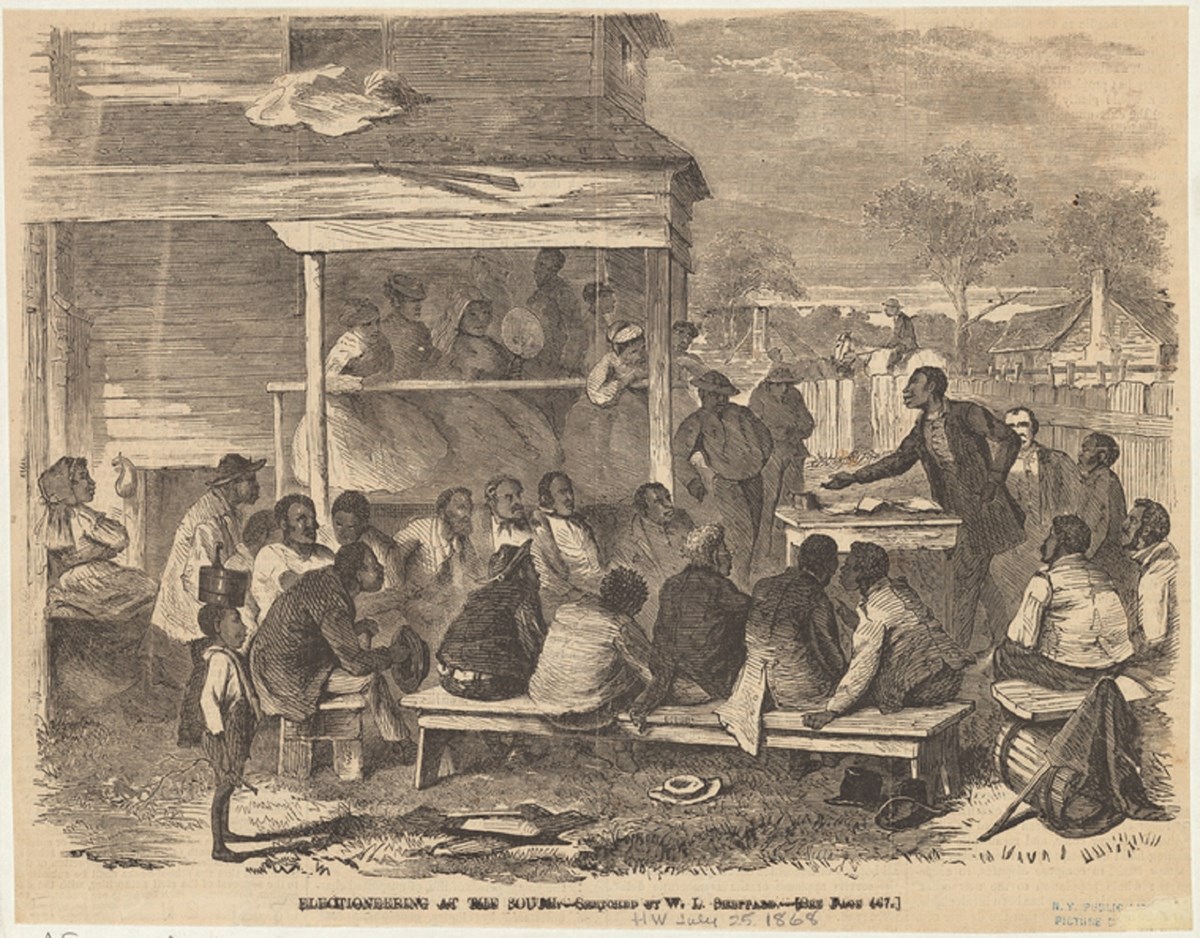
Electioneering in the South, circa 1868. Art and Picture Collection, The New York Public Library, https://digitalcollections.nypl.org/items/510d47e1-3fa3-a3d9-e040-e00a18064a99
The right to vote is seen in the U.S. as one of the most fundamental tenets of the nation’s democracy. However, historically many people who qualified as citizens of the republic were denied the right to vote from the beginning, including women and poor White men. In the early days of the Republic, the franchise was given only to White males who owned property.
Immediately after the Civil War, as a result of Union soldiers being stationed in Southern states, newly freed slaves were allowed to vote. Before the passing of the 15th Amendment, Congress had passed the Territorial Suffrage Act as means of allowing Blacks to vote in the newly opened U.S. territories.
“The right of citizens of the United States to vote shall not be denied or abridged by the United States or by any State on account of race, color, or previous condition of servitude. The Congress shall have power to enforce this article by appropriate legislation.” So reads the 15th Amendment, ratified on February 3, 1870, the third of what came to be known as the Reconstruction amendments.
The Reconstruction amendments included the 13th, which outlawed slavery, and the 14th, which granted citizenship to the freed slaves as well as guaranteeing equal protection under the law.
The 15th Amendment was passed by the United States Congress in 1869 in a move designed to assure the right to vote to its newly freed ex- slaves.
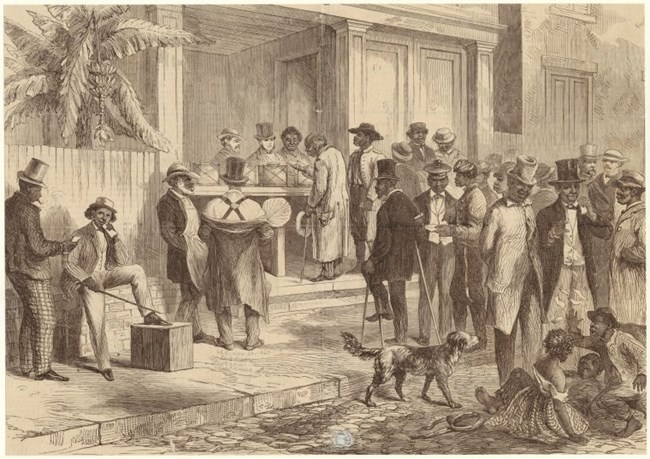
Freedmen Voting in New Orleans, circa 1867. Art and Picture Collection, The New York Public Library, https://digitalcollections.nypl.org/items/510d47e1-3fd9-a3d9-e040-e00a18064a99
The Radical Republicans did not wholeheartedly support the bill because it did not include wording that would prohibit poll taxes and literacy tests that were already being employed to prevent Blacks from voting. The monied class among the Whites recognized immediately the danger of Blacks being able to vote. Not only would White Supremacy be challenged, but they understood the ex-slaves had a more egalitarian, labor rights-friendly and social justice-oriented political agenda.
Technically, as citizens of the U.S., the freedmen had the franchise, but this amendment sought to cement that idea and prevent interference with Black voting. The newly freed slaves quickly took advantage of their ability to vote and voted their interests, which ironically helped lift the plight of their poor White brethren. As a result of being able to vote, Black voters sent several of their own to Congress. One of the most notable was Hiram Revels of Mississippi.
Revels was the first African American senator. He was one of the 16 Black men from seven Southern states who served in Congress during the Reconstruction era (1865-1877). They served as public officials under the constant threat of racial violence. In fact, Revels was eventually literally chased out of office and had to run to avoid being lynched.
The 15th Amendment did not give women the right to vote, nor did it give Native Americans the franchise. It continued to exclude ethnic Chinese, but it did open the door for poor White males.
The Amendment was ratified by 29 states. (Tennessee did not ratify the amendment until 1997.)
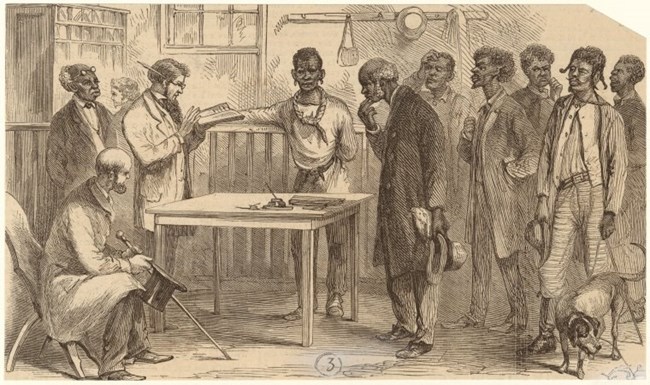
Voter Registration, Macon, Ga., Art and Picture Collection, The New York Public Library, https://digitalcollections.nypl.org/items/510d47e1-3fa4-a3d9-e040-e00a18064a99
The failure to enfranchise women caused a rift in the Women’s Suffrage Movement in which many supporters of suffrage were also abolitionists. Leading women voting rights advocates Susan B. Anthony and Elizabeth Cade Slaton broke with the leading suffrage group as a result of Black voting rights being protected, but women were still left without the franchise.
While allowing the ex-slave the vote was a significant step in including the freedmen and women in U.S. society, the move was not altruistic. The ending of slavery meant the ending of the three-fifth clause in the Constitution. As a result, the newly freed slaves would be counted as individuals and would increase the representation of Southern states, which were more populous than Northern states as a result of the ex-slaves.
The Southerners sought to use this representation to their advantage by attempting to prevent African Americans, who overwhelmingly supported the Republican Party, from voting. White supremacist groups like the Ku Klux Klan, Red Brigade and White Citizens Councils also formed following the Civil War. These terrorist groups engaged in violence and other racist tactics to intimidate African Americans, people of color, Black voters and legislators.
In a history seldom told, in North Carolina, Louisiana and Mississippi hundreds of Blacks were murdered in local coup de tat’s in which White Supremacists overthrew democratically elected city governments by force. These terrorist acts to limit voting were accompanied by the Black Codes.
The Black Codes were enacted by Southern states as a means to technically re-enslave Blacks and make them a permanent caste and underclass in the U.S. The codes sought to prevent Blacks from purchasing and owning guns and land. They restricted Blacks’ movement through racist vagrancy laws in which a Black person had to have a White person vouch for them.
The Black Codes forced the former slaves to enter into exploitative, yearlong labor contracts that hindered their ability to sell their labor to the highest bidder. Under the codes, no Black person could testify in court or sue a White person.
Historically, the 1965 Voting Rights Act sought to do what the 15th Amendment was designed to accomplish, which was to assure that Black people, especially in the Southern states, could cast their ballots. Sections 4 and 5 of the Voting Rights Act required states and local governments with histories of racial discrimination in voting to submit all changes to their voting laws or practices to the federal government. Once approved, they could take effect, a process called “preclearance.”
However, the Supreme Court has loosened the rules, opening the door to chicanery on the part of those who seek to limit the civil rights of Blacks and people of color. It includes proposed voter ID laws; closing polling stations, putting them out of the reach of the transit-challenged; and eliminating people from the voter rolls who have skipped an election or two.
While the right to vote by U.S. citizens has never been in question, who can vote is still being hotly contested in the U.S. as various states continually seek to find ways to prevent people from voting, especially Black and Brown people.
Black people’s political power is diminished by the fact that incarceration serves as a disqualification from the voting rolls, especially since a higher percentage are locked up by the bias inherent in the U.S. justice system. Moreover, though the first section of the 15th Amendment declared that the right to vote cannot be “denied or abridged” because of “a previous condition of servitude,” ex-prisoners are consistently denied the right to vote, a clear violation of the spirit of the amendment.
Apparently, judging from the history of Blacks and the vote, it is a right as long as they are willing to fight for it.
W.E.B. DuBois observed, “The slave went free; stood for a brief moment in the sun; then moved back again toward slavery.”
#NNPA BlackPress
NNPA NEWSWIRE — Reflecting on his long career, Biden expressed deep gratitude and pride. “Nowhere else on earth could a kid with a stutter from modest beginnings in Scranton and Claymont one day sit behind the Resolute Desk in the Oval Office. But here I am. That’s what makes America special,” he remarked, his voice tinged with emotion.
The post first appeared on BlackPressUSA.

Biden: Our Democracy Demands New Leadership
By Stacy M. Brown, NNPA Newswire Senior Correspondent
@StacyBrownMedia
In an impassioned address from the Oval Office, President Joe Biden laid bare his decision to step down from the 2024 presidential race, urging Americans to embrace a new generation of leadership. “Saving democracy is more important than any title. It’s time to pass the torch to younger voices,” Biden declared in an address that signaled a transformative shift in American politics.
Following his decision over the weekend to bow out of the race for re-election, Biden’s announcement was a clarion call for renewal. Stressing the moment’s urgency, Biden emphasized that the future of democracy depends on fresh, dynamic leadership. He endorsed Vice President Kamala Harris as the embodiment of this new era. “Years ago, I described myself as a transitional candidate, and now it’s time for that transition to take full effect,” Biden said, positioning Harris as the future of the Democratic Party.
While refraining from mentioning former President Donald Trump by name, Biden clarified that he views the twice impeached and 34 times convicted felon Republican presidential nominee as a fundamental threat to democratic values. “My record as president, my leadership on the global stage, and my vision for America’s future all merited a second term,” Biden stated. “But nothing can stand in the way of safeguarding our democracy. That includes personal ambition. So, I’ve decided the best path forward is to pass the torch to a new generation.”
Reflecting on his long career, Biden expressed deep gratitude and pride. “Nowhere else on earth could a kid with a stutter from modest beginnings in Scranton and Claymont one day sit behind the Resolute Desk in the Oval Office. But here I am. That’s what makes America special,” he remarked, his voice tinged with emotion.
Biden acknowledged that doubts about his ability to defeat Trump influenced his decision. “I revere this office, but I love my country more,” he said. “It’s been the honor of my life to serve as your president. But in defense of democracy, which is at stake, I think it’s more important than any title.”
Biden said he is determined to address crucial issues for the remainder of his term. His agenda includes lowering family costs, defending personal freedoms, protecting voting rights, combating cancer, addressing gun violence, and advocating for Supreme Court reform. Internationally, he said he aims to strengthen NATO, support Ukraine, and seek an end to the conflict in Gaza.
Biden’s endorsement of Harris has galvanized the Democratic Party, with Harris swiftly securing the backing of a majority of Democratic delegates. “I’m not going anywhere,” Biden reassured his campaign staff, now supporting Harris. “I’m going to be out there on the campaign trail with her, working tirelessly as both a sitting president and a campaigner.”
The landmark address, along with Biden’s anticipated speech at the Democratic National Convention, could prove pivotal in defining his legacy. “In a few months, Americans will decide the direction of our nation’s future,” Biden stated. “I have made my choice. I’ve expressed my views. Now the decision is in your hands, the hands of the American people.”
In the days before his decision, Biden confided in close advisors about his concerns regarding another run against Trump. His acknowledgment of those doubts underscored his commitment to putting the country’s needs above his ambitions. “The defense of democracy must come before all else,” he reiterated.
As Biden prepares to support Harris in her campaign, he remains focused on his presidential duties. His administration continues to push for significant legislative achievements, reinforcing his enduring commitment to the American people. “In just a few months, the American people will choose the course of America’s future,” Biden said. “The great thing about America is here, kings and dictators do not rule. The people do. History is in your hands. The power is in your hands. The idea of America lies in your hands.”
The post first appeared on BlackPressUSA.
#NNPA BlackPress
PRESS ROOM: Reparations Movement Partners Globally Mourn the Passing of U.S. Congresswoman Sheila Jackson-Lee
NNPA NEWSWIRE — we acknowledge the powerful legacy of U.S. Congresswoman Sheila Jackson-Lee. She was a steadfast leader in the fight for reparatory justice, carrying forward the legislative baton from the late U.S. Congressman John Conyers in 2018.
The post PRESS ROOM: Reparations Movement Partners Globally Mourn the Passing of U.S. Congresswoman Sheila Jackson-Lee first appeared on BlackPressUSA.

[July 22, 2024 – Chicago, IL] With an extremely heavy heart and a profound sense of loss, we acknowledge the powerful legacy of U.S. Congresswoman Sheila Jackson-Lee. She was a steadfast leader in the fight for reparatory justice, carrying forward the legislative baton from the late U.S. Congressman John Conyers in 2018. Her relentless efforts nearly brought HR 40 to passage in the House of Representatives in 2022, missing by just one vote. Her leadership was pivotal in advancing the bill out of the Judiciary Committee in April 2021 after a historic debate. Even after her diagnosis, Rep. Jackson-Lee fiercely collaborated with reparations leaders, pushing for President Biden to establish an HR40-like commission by Executive Order. She believed this executive path was crucial for addressing centuries of injustice. Despite setbacks in meetings with the President’s team, she remained optimistic and urged us to stay ready for progress.
The Earn the Black Vote Collaborative formed in 2023 in response to her urging to continue the fight for reparations. On April 25, 2024, the Collaborative released a poll showing significant support for President Biden to issue an Executive Order for Reparations. Congresswoman Jackson-Lee championed the poll’s findings, emphasizing the critical importance of reparations to African American and progressive communities. Her vision was clear: an Executive Order to create a federal reparations commission could drive transformative Black voter turnout and move the ball toward justice. She had wanted the Executive Order done by Juneteenth. Tragically, just a month after Juneteenth, she left us. We have lost a great leader for reparatory justice. In honor of her legacy, we call for the establishment of the Executive Order by President Biden. We extend our deepest condolences to Representative Jackson-Lee’s family. We call on reparation activists, leaders, and legislators globally to stand with us as we honor her legacy. May the Ancestors and the Creator receive her with joy.
About the Author:
Kamm Howard is a national and international reparations scholar and activist working for over 20 years building grassroots movements to obtain reparations for African descendants in the United States.
CONTACT:
Reparations United Phone: 773-985-2990
Email: kamm@reparationsunited.org Website: https://reparationsunited.org/
The post PRESS ROOM: Reparations Movement Partners Globally Mourn the Passing of U.S. Congresswoman Sheila Jackson-Lee first appeared on BlackPressUSA.
#NNPA BlackPress
OP-ED: Vice-President Kamala is Ready!
CAPITAL OUTLOOK — As I noted in my Op-Ed, three weeks ago, our vice president is ready to be the next president of the United States. End of discussion! The delegates to the Democratic National Convention next month, should enthusiastically nominate her to lead the ticket. Vice-President Kamala Harris will energize the electorate; she will create great excitement and hope. President Biden’s decision has proven again that he loves this country; he is a dear patriot; and he is a great man!
The post OP-ED: Vice-President Kamala is Ready! first appeared on BlackPressUSA.
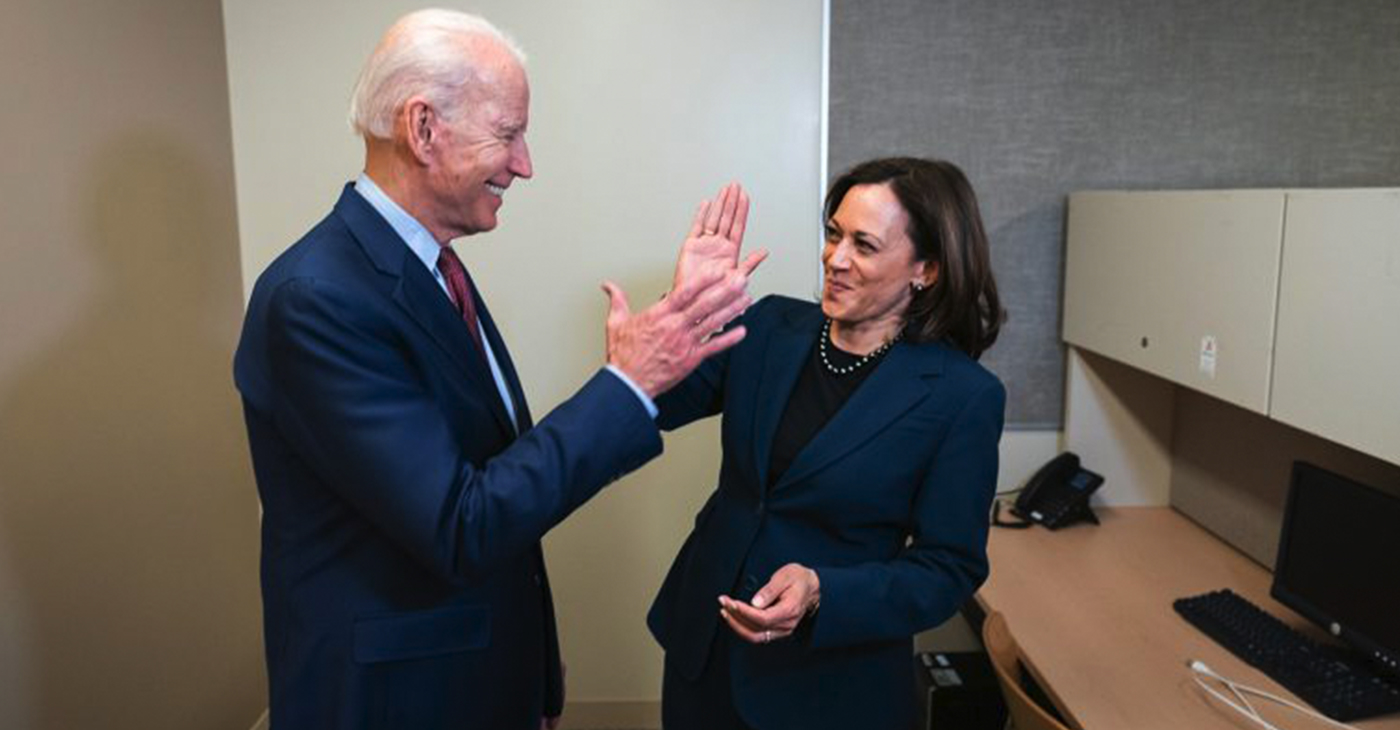
By Reverend Dr. RB Holmes, Jr.
We must commend and appreciate President Joseph Biden for being a quintessential leader and, perhaps, one of the best presidents in modern political history. He is not finished yet. He will complete his agenda of appointing qualified federal judges, reducing the cost of prescription drugs, working for a cease-fire in the Middle East, and building a stronger economy for all Americans. President Biden has endorsed his Vice-President, the Honorable Kamala Harris, to head the Democratic ticket for the presidency.
As I noted in my Op-Ed three weeks ago, our vice president is ready to be the next president of the United States. End of discussion! The delegates to the Democratic National Convention next month should enthusiastically nominate her to lead the ticket. Vice-President Kamala Harris will energize the electorate; she will create great excitement and hope. President Biden’s decision has proven again that he loves this country; he is a dear patriot; and he is a great man!
President Biden: Should he stay, or should he leave?
By Reverend Dr. RB Holmes, Jr.
This query is perhaps one of the greatest questions of the last 248 years. In my humble opinion, the answer to this question will decide what kind of nation we will leave to future generations. As it relates to baby boomers, the answer to this question will determine the quality of ourselves as it relates to, hopefully, “the bonus years” that remain.
The Democratic Party is having a proverbial meltdown since the June 27, 2024, debate debacle by President Biden. Democrats can’t get out of their way. Some believe that President Biden should step aside for what appears to be his failing health. Others in the party are standing with the president, saying, in essence, he should remain in the race. What are you saying? Should he stay, or should he leave?
Full disclosure: I am an independent. I once was a Democrat and even a Republican. The Republican Party ran me out of the party. I really couldn’t stay in a party that is destroying and dismantling programs and policies that I truly believed made this country great.
Let’s turn our attention back to the Biden challenge. I voted for President Biden and will gladly vote for him again if he remains in the race. President Joe Biden is a good man:
He is a man of great character and integrity.
He brought us through the worst pandemic in our lifetime. He didn’t recommend injecting “bleach.” He provided resources to struggling Americans to keep food on their tables and most importantly, he trusted the vaccine and the medical community’s advice. This president didn’t weaponize this deadly virus for political points.
President Biden helped bring this economy out of an impending recession and has advocated for the expansion of Medicaid rather than its elimination.
President Biden is bringing down the high cost of prescription drugs, especially for the elderly and the poor.
President Biden is fighting to save Obamacare, social security, the environment, and good-paying jobs for all Americans.
President Biden is a strong advocate for the Civic Rights Bill of 1964, The Voting Rights Bill of 1965, and the Fair Housing Bill of 1966.
President Biden is an advocate for diversity, equity, and inclusion (DEI).
President Biden is for affirmative action programs.
President Biden is for women making their own health decisions.
President Biden will stand up for the rights of the Dreamers. He hasn’t demonized immigrants. Unlike the Republican Party’s likely nominee, I don’t recall President Biden ever saying he doesn’t want people coming to the United States from those “s____ hole” countries.
President Biden has never been an advocate for white supremacy. Remember, he decided to run for president because of the pro-supremacy march in Charlottesville, Virginia. His slogan became “I am fighting for the soul of the nation!” Friends, unfortunately, this nation’s soul is sick. We need someone in that White House who does not give voice to white supremacy nor give support to the proud boys. President Biden is proud to be an American.
The question is whether President Biden should stay or go. Jesus said, “You will know them by their fruits. (St. Matthew 7:16) After the debate between President Biden and former President Donald J. Trump, begin to examine the fruit. In essence, I became a fruit inspector. Yes, the president acknowledged he had a bad debate and confirmed that he is no longer a smooth talker: his steps are slower, and he isn’t as articulate as he was in the past. The question is, who is? As a fruit inspector, I don’t think we ought to cut down the entire tree because of a bad branch.
Let me continue to examine the Biden fruit. Yes, it is an old tree, but old trees are full of shade, wisdom, hope, experience and tenacity. Biden was appointed by the first Black president to serve this country in 248 years, the honorable Barack Hussein Obama. Oh yes! He saw the good fruit. The powerful United States Congressman, the Honorable Jim Clyburn (D-SC), saw this good fruit when he enthusiastically endorsed Joe Biden in 2020 for president. I met Congressman Clyburn a few Sundays ago when he spoke at the Mount Zion Baptist Church in Albany, Georgia, where the pastor is Reverend Daniel Simmons. At that service, Congressman Clyburn told the story of an elderly woman at a funeral who asked him, “who was he voting for.” He told her Joe Biden and the rest is history. Congressman Clyburn is still standing with Joe Biden. Why? He has seen a fruit tree producing good fruit.
Congressman Clyburn has witnessed up front and close the good decisions that President Biden has made and will continue to make. The man has sound judgment, and he has wisdom. President Biden selected The Honorable Senator Kamala Harris to be his Vice President. Her selection was indeed an historic and transformative decision. Listen, I have personally met Vice President Kamala Harris. She is the real deal. She is brilliant, she is intelligent, and she is probably one of the best vice presidents to ever serve this nation.
Also, as I examine the Biden tree, he is decisive and courageous in making the right decisions and appointments. He appointed the first black female to the United States Supreme Court. Yes, the Supreme Court: the honorable Associate Justice, Ketanji Brown Jackson. In reference to federal judges, President Biden has appointed more black federal judges than any president in these 248 years of this nation. Trust me, federal judges matter.
The next president will most likely appoint two or more justices to the mighty Supreme Court, a court today that is radically and cynically erasing the significant rulings of the 20th century. Melvin and the Blue Notes are prophetically telling us to “Wake up everybody!” While the country is in a debate about Biden, we are losing our hard-earned rights of yesteryears.
The question is should Biden stay, or should he step down? My answer is he should stay in the race for a second term. This decision is between President Biden and his family. I believe this president will make the best decision for the good of this country. Moreover, he has an impressive record of achievements and accomplishments in his fifty-plus years as a faithful public servant. I hope we would not allow a 90-minute debate to be the defining moment of a stellar political career of fifty remarkable years. He has provided this nation with faithful, forthright, and fruitful leadership. I pray to God that he would be healthy enough to continue to “bring forth good fruits.”
Let’s look into the future. If, for some reason, President Biden should step aside, there is a viable and venerable alternative. That person is the sitting vice president of this nation, the gifted Kamala Harris. This nation is blessed and highly favored to have such an incredible person ready to accept the baton and lead us to victory in November. Please do not let the negative talking heads convince you that she isn’t ready. She will be ready, and she is ready to serve, protect, and defend the values of this nation.
Again, President Biden made a masterful decision to select her as his running mate. If she gets the call, she will motivate the base to turn out in record-breaking numbers. She will defeat her opponent; she will unite this country, and she will bring hope and steadfast leadership as our next president. Listen, there should be no division at the Democratic Party’s National Convention if President Biden should decide to step aside. Vice-president Harris is ready to step up!
Reverend Dr. RB Holmes is CEO and Publisher of the Capital Outlook Newspaper and the Pastor of the Historic Bethel Missionary Baptist Church in Tallahassee, FL.
The post OP-ED: Vice-President Kamala is Ready! first appeared on BlackPressUSA.
-

 Arts and Culture3 weeks ago
Arts and Culture3 weeks agoRooted in Tradition: The Intricate History of Black Hair Braiding
-

 Bay Area4 weeks ago
Bay Area4 weeks ago“I Will Not Be Bullied,” Says Oakland Mayor Sheng Thao
-

 Bay Area2 weeks ago
Bay Area2 weeks agoPG&E Increases Rates While Bay Area Households Are Struggling to Stay Afloat
-

 Business3 weeks ago
Business3 weeks agoGov Newsom: Raising Fast Food Minimum Wage to $20 Pays Off as Jobs Multiply in Industry
-

 Activism4 weeks ago
Activism4 weeks agoOpponents of Mayor Sheng Thao Are Calling on Her to Resign Following FBI Raid
-

 Community1 week ago
Community1 week agoHundreds Come to Jehovah’s Witnesses’ Assembly Hall for Three-Day Program of ‘Good News’ in Fremont
-

 Bay Area2 weeks ago
Bay Area2 weeks agoJuneteenth Mass Shooting Suspect Charge with Multiple Counts of Felony Assault by Alameda County DA Pamela Price
-

 Activism4 weeks ago
Activism4 weeks agoOakland Coliseum Sale to AASEG: A Model for Community Development and Inclusion











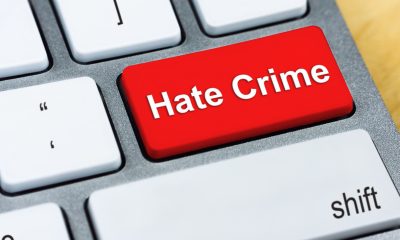










































Pingback: Panafricanmedia Networks